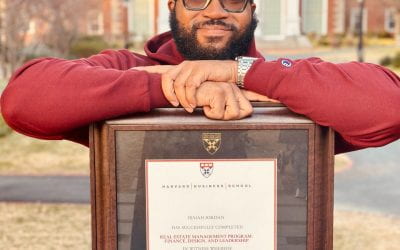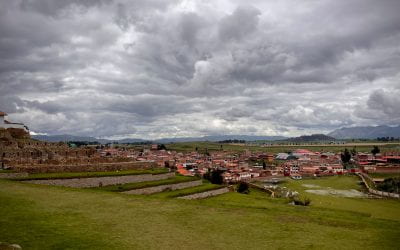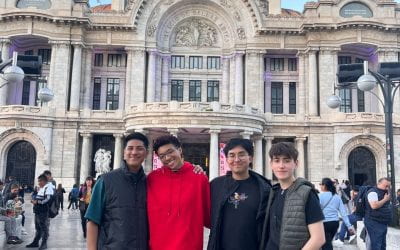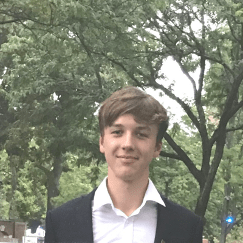
About the Author
Max Shakespeare is a rising sophomore at Harvard, currently on a LOA and working on an Edtech start-up. Although undeclared, he is interested in economic development and Latin America. On campus, he is also a member of the crew team, the edible food magazine and the Harvard Undergraduate Foreign Policy Initiative.
Acerca del Autor
Max Shakespeare es un estudiante de segundo año en Harvard, actualmente en una LOA y trabajando en un Edtech startup. Aunque no está declarado, está interesado en el desarrollo económico y América Latina. En el campus, también es miembro del equipo del remo, la revista edible (de comida) y la Iniciativa de Política Exterior de Harvard.
Changemaking in Argentina with DRCLAS

Obelisk in the city of Buenos Aires overlooking 9 de Julio Avenue. Photo by Nestor Barbitta on Unsplash
I was incredibly excited at the prospect of spending last summer in Buenos Aires. Streetside tango, huge murals and barbeques overflowing with fresh steak seemed to provide the perfect backdrop to immersing myself in Spanish and the world of work with the DRCLAS Summer Internship Programme.
I was interning with SOCIALAB which was a social entrepreneurship lab with branches across the continent. I was eager to learn about the space and how innovative solutions could be used to stimulate growth and generate a positive impact across Latin America. I am interested in economic development and the case of Argentina is particularly unique as a country that has achieved extreme wealth and then experienced a reversal in economic prosperity. And I think the potential for entrepreneurship in creating unique solutions to address serious societal problems, economic growth and employment among these, is an exciting one.
Unfortunately, the pandemic meant that we had to conduct the internships online, but both DRCLAS and Socialab ensured that this experience was as immersive and insightful as possible in the circumstances. I was slightly nervous about the program given that I hadn’t done any Spanish since high school and all the Spanish I had learned was Castellano. I’d heard many stories about the dialect of the Rioplatense where slang pervades common conversation, the voseo form introduces a whole new form of address and the already strange “y” pronunciation of “ll” was to be replaced by a “sh.” I had also never done any professional work and so the thought of doing my first internship in an area I didn’t have much experience in and a language I didn’t have a complete grasp of was a tad scary.
But, I was immediately warmly welcomed into a friendly and tight-knit team at Socialab. I’d read about the Porteño/a, someone from Buenos Aires, and how they were characterized by being extroverted and animated. And these definitely rang true. Our first meeting consisted of a detailed explanation of many of the cultural nuances that I would one day have to experience in person: the universal obsession with maté, which every member of Socialab would be drinking at every meeting, the excessively large asadas and complete laid backness of Argentines.
The work of Socialab had shifted quite significantly as a result of the pandemic and the organization was focused on carrying out initiatives to contribute to the fight against Covid and its impact across all sectors. They were hosting start-up competitions to encourage individuals to think up novel ideas for tackling the problems that the pandemic had raised in education, health and work. I helped them run workshops for entrepreneurs looking to turn these ideas for change into a reality, judge the applications that were sent in for the competitions and analyze the data from the start-ups that had been through Socialab with the aim of spotting how Socialab could be of most help in the future.
I was able to interview a number of successful entrepreneurs and investors in the region to conduct my own research on how we could go about promoting the viability of entrepreneurship in the region. It was difficult to see how many entrepreneurs had given up on their businesses because of a lack of adequate funding or support even before Covid. Through various interviews with founders of start-ups that had managed to thrive in this difficult environment and VC partners operating in the area, I was able to gain some insight into what it takes for a socially oriented business to take off in the region. I was able to talk to Gabriel Marcolongo, who started incluyeme which is a company that provides working opportunities and jobs to people with disabilities. He told me about how he was able to navigate the difficulties of doing business in Latin America to reach a stage where he’s been able to help more than 1900 people with disabilities into employment.
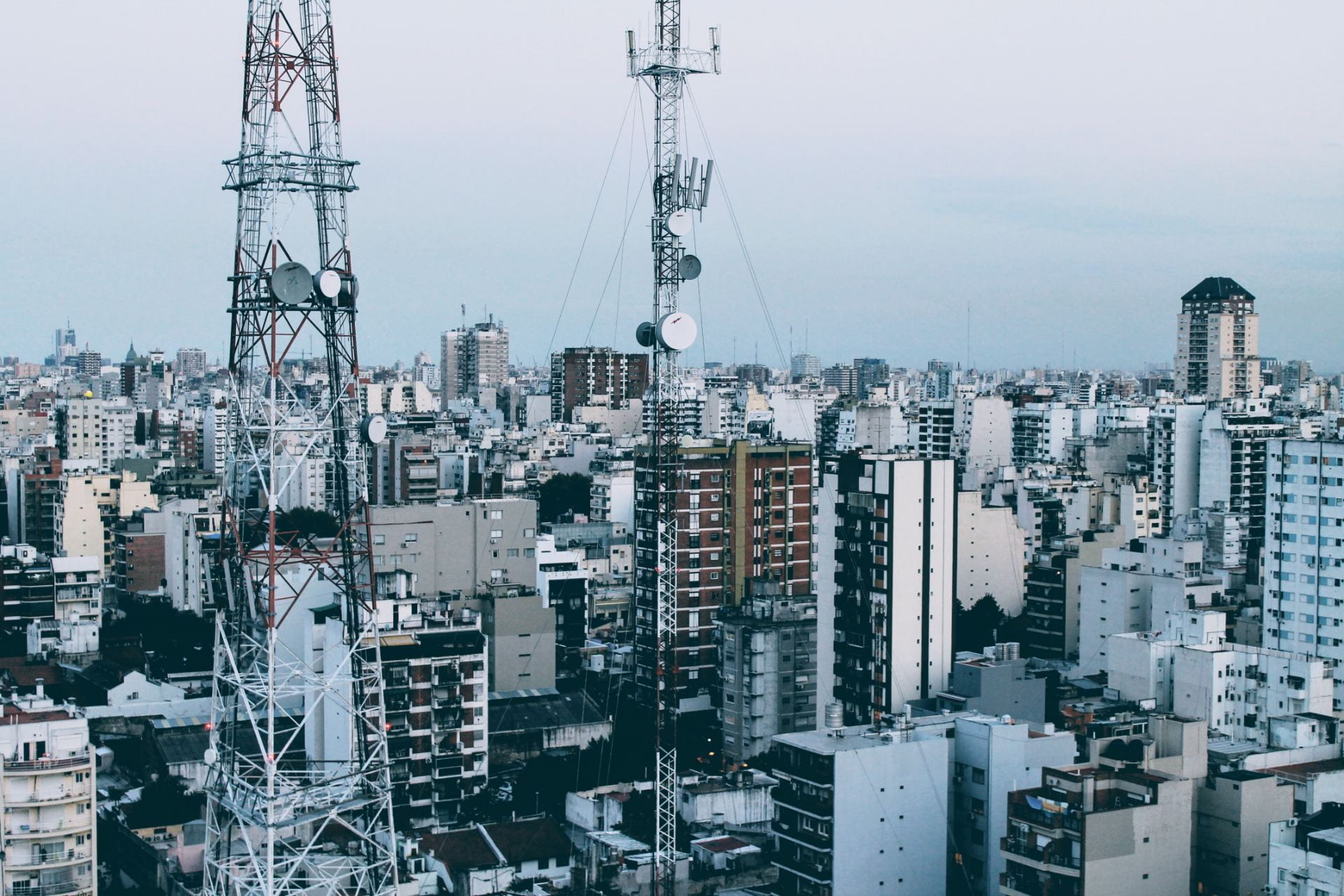
Buenos Aires City. Photo by Juan Pablo Donadías on Unsplash
The lack of significant regional early stage start-up funding is an issue, but for companies looking to prioritize impact over profit it becomes near impossible. Gabriel secured most of his funding from government initiatives like Startup Chile. Private investors want to see a significant return and this often comes at the cost of impact. While companies like Socialab are trying to change this, the size of their grants makes it difficult for companies that go through their program to grow. I also got the chance to interview Matias Lanus, the vice president at Elevar Equity, to talk about the work Elevar does in making investments in Latin America that do try and maximize impact while also making a profit.
After my time with Socialab came to an end and Harvard made the decision to have all classes online, I decided to take a leave of absence with the hope of unpacking Argentina further. With the help of María José, who was an incredible resource throughout the summer program, I was able to carry out some work for the Argentine Ministry of Justice and Human Rights. The transition from addressing societal problems through entrepreneurship to laws was an interesting one.
Much of my work centered around Law 27.372 which aimed to give more rights to victims of crime to limit the suffering they experience as a result of the crime and judicial process. This was done by giving them a more active role in the whole process. The law created a centre of assistance for victims of crime across the national network of Centres of Justice which provide immediate assistance to victims to guarantee their security when needed, giving them accommodation, food, medical attention, psychological attention and legal help to try avoid the possibility of revictimization.
While it was made a federal law in 2017, few provinces had adopted the law on the provincial level. I was tasked with finding out which provinces had and which hadn’t. My supervisor, in our first meeting, presented me with a lot of documents going over the structure of the Argentine legal system and Law 27.372. She was worryingly surprised to hear I wasn’t a graduate in law with experience in Latin American legal systems.
Through looking through provincial constitutions and governmental documents, I was only able to identify 6 (out of 23) provinces which had made an attempt to incorporate either the entire law or certain articles into their provincial law. I also helped in compiling free legal resources in each province for citizens across the country to draw on when necessary. This was all very helpful for my technical Spanish and gave me an appreciation for the difficulty in popularizing such vital legal practices across an entire country.
The sadness with remote internships is the lack of cultural immersion, but the number of remote events that DRCLAS arranged definitely helped with this. We listened to experts talk about Argentina from every lens. We covered Argentine history, looking at the Dirty War, rise of Peronism and the resulting cortoplacismo (short-termism) which has condemned Argentina to a turbulent political and economic path. We looked at the urban development plans for slums like Villa 31 and human rights, football and culture. These sessions carried out with other DRCLAS interns were vital for contextualizing the work we were doing and improving our understanding of the people we were working with, but also in maintaining a sense of community throughout the summer. And while I no longer had DRCLAS culture sessions with my internship at the Ministry of Justice, my supervisor made sure to provide me with any resources or answer any questions on subjects I wanted to explore further. I am hugely grateful to DRCLAS, María José Ferryra and my supervisors at Socialab and the MOJ for providing such incredible learning opportunities and hope that one day I will be able to experience Argentina in person, walking the Caminito, eating at a traditional parilla and explore the city that Borges thought to be as eternal as water and air.
Creando Cambio en Argentina con DRCLAS
Por Max Shakespeare

Obelisk in the city of Buenos Aires overlooking 9 de Julio Avenue Photo by Nestor Barbitta on Unsplash
Estaba increíblemente emocionado por la posibilidad de pasar el verano pasado en Buenos Aires. El tango en la calle, los enormes murales y las parrilladas rebosantes con carne fresca parecían proporcionar el telón de fondo perfecto para sumergirme en el español y el mundo laboral con el Programa de SIP de DRCLAS.
Estaba haciendo una pasantía en SOCIALAB, que era un laboratorio de emprendimiento social con sucursales en todo el continente. Estaba ansioso por aprender sobre el espacio y cómo se podrían utilizar soluciones innovadoras para estimular el crecimiento y generar un impacto positivo en América Latina. Me interesa el desarrollo económico y el caso de Argentina es particularmente único como un país que ha logrado una riqueza extrema y luego experimentó un retroceso en la prosperidad económica. Y creo que el potencial del espíritu empresarial en la creación de soluciones únicas para abordar los problemas sociales graves, el crecimiento económico y el empleo entre estos, es emocionante.
Desafortunadamente, la pandemia significó que tuvimos que realizar las pasantías en línea, pero tanto DRCLAS como Socialab se aseguraron de que esta experiencia fuera lo más inmersiva y reveladora posible en las circunstancias. Estaba un poco nervioso por el programa dado que no había hecho nada de español desde la secundaria y todo el español que había aprendido era castellano. Había escuchado muchas historias sobre el dialecto del Rioplatense donde la jerga impregna la conversación común, la forma voseo introduce una forma completamente nueva de dirección y la ya extraña pronunciación de la “y” de “ll” iba a ser reemplazada por una “sh”. Además, nunca había hecho ningún trabajo profesional, por lo que la idea de hacer mi primera pasantía en un área en la que no tenía mucha experiencia y un idioma que no entendía por completo me asustaba un poco.
Pero, inmediatamente fui recibido calurosamente en un equipo amistoso y unido en Socialab. Había leído sobre el porteño/a, y cómo se caracterizaba por ser extrovertido y animado. Y estos definitivamente sonaban verdad. Nuestro primer encuentro consistió en una explicación detallada de muchos de los matices culturales que un día tendría que experimentar en persona: la obsesión universal por el mate, que todos los miembros de Socialab beberían en cada reunión, los asados excesivamente grandes y la naturaleza completamente relajada de los argentinos.
El trabajo de Socialab cambió significativamente como resultado de la pandemia y la organización estaba enfocada en llevar a cabo iniciativas para contribuir a la lucha contra el Covid-19 y su impacto en todos los sectores. Organizaron concursos de empresas emergentes para alentar a las personas a pensar en ideas novedosas para abordar los problemas que la pandemia había planteado en la educación, la salud y el trabajo. Les ayudé a realizar talleres para emprendedores que buscaban convertir estas ideas de cambio en realidad, juzgar las solicitudes enviadas para los concursos y analizar los datos de las startups que habían pasado por Socialab con el objetivo de detectar cómo Socialab podría ser de mayor ayuda en el futuro.
Pude entrevistar a varios emprendedores e inversores exitosos de la región para realizar mi propia investigación sobre cómo podríamos promover la viabilidad del espíritu empresarial en la región. Era difícil ver cuántos empresarios habían renunciado a sus negocios debido a la falta de financiación o apoyo adecuados incluso antes de Covid. A través de varias entrevistas con fundadores de empresas emergentes que habían logrado prosperar en este entorno difícil y socios de capital de riesgo que operan en el área, pude obtener una idea de lo que se necesita para que una empresa con orientación social despegue en la región.
Hablé con Gabriel Marcolongo, quien comenzó Inluyeme, que es una empresa que brinda oportunidades laborales y empleos a personas con discapacidad. Me contó cómo pudo sortear las dificultades de hacer negocios en América Latina para llegar a una etapa en la que pudo ayudar a más de 1900 personas con discapacidades a encontrar empleo.
La falta de fondos importantes para la puesta en marcha regional en las primeras etapas es un problema, pero para las empresas que buscan priorizar el impacto sobre las ganancias se vuelve casi imposible. Gabriel obtuvo la mayor parte de su financiamiento de iniciativas gubernamentales como Startup Chile. Los inversores privados quieren ver un rendimiento significativo y esto a menudo tiene el costo del impacto. Si bien empresas como Socialab están tratando de cambiar esto, el tamaño de sus subvenciones dificulta el crecimiento de las empresas que pasan por su programa. También tuve la oportunidad de entrevistar a Matias Lanus, vicepresidente de Elevar Equity, para hablar sobre el trabajo que hace Elevar al realizar inversiones en América Latina que intentan maximizar el impacto y al mismo tiempo obtener ganancias.
Cuando mi tiempo con Socialab llegó a su fin y Harvard tomó la decisión de tener todas las clases online, decidí tomar una licencia con la esperanza de desempacar más a Argentina. Con la ayuda de María José Ferreyra, quien fue un recurso increíble durante todo el programa de verano, pude realizar un trabajo para el Ministerio argentino de Justicia y Derechos Humanos. La transición de abordar los problemas sociales a través del espíritu empresarial a las leyes fue interesante.
Una gran parte de mi trabajo se centró en la Ley 27.372 que tenía como objetivo otorgar más derechos a las víctimas de delitos para limitar el sufrimiento que experimentan como resultado del delito y el proceso judicial. Les dio un papel más activo en todo el proceso. La ley creó un centro de atención a víctimas de delitos a través de la red nacional de Centros de Justicia que brindan asistencia inmediata a las víctimas para garantizar su seguridad cuando sea necesario, brindándoles alojamiento, alimentación, atención médica, atención psicológica y asistencia legal para tratar de evitar la posibilidad de revictimización.

Buenos Aires City. Photo by Juan Pablo Donadías on Unsplash
Si bien se convirtió en una ley federal en 2017, pocas provincias habían adoptado la ley a nivel provincial. Se me asignó la tarea de averiguar qué provincias la adoptaron y cuáles no. Mi supervisor, en nuestra primera reunión, me presentó una gran cantidad de documentos sobre la estructura del sistema legal argentino y la Ley 27.372. Le sorprendió preocupantemente saber que yo no era un licenciado en derecho con experiencia en los sistemas legales latinoamericanos.
Al revisar las constituciones provinciales y los documentos gubernamentales, solo pude identificar 6 (de 23) provincias que habían intentado incorporar la ley completa o ciertos artículos en su ley provincial. También ayudé a recopilar recursos legales gratuitos en cada provincia para que los ciudadanos de todo el país pudieran utilizarlos cuando fuera necesario. Todo esto fue muy útil para mi español técnico y me dio una apreciación de la dificultad de popularizar prácticas legales tan vitales en todo un país.
La tristeza de las pasantías remotas es la falta de inmersión cultural, pero la cantidad de eventos remotos que DRCLAS organizó definitivamente ayudó con esto. Escuchamos a los expertos hablar sobre Argentina desde todos los ángulos. Cubrimos la historia argentina, mirando la Guerra Sucia, el ascenso del peronismo y el cortoplacismo resultante que ha condenado a Argentina a un turbulento camino político y económico. Analizamos los planes de desarrollo urbano para barrios marginales como Villa 31 y los derechos humanos, el fútbol y la cultura. Estas sesiones realizadas con otros pasantes de DRCLAS fueron vitales para contextualizar el trabajo que estábamos haciendo y mejorar nuestra comprensión de las personas con las que estábamos trabajando, pero también para mantener un sentido de comunidad durante todo el verano.
Aunque no tuve sesiones de cultura con mi pasantía en el Ministerio de Justicia, mi supervisor se aseguró de proporcionarme cualquier recurso o responder cualquier pregunta sobre temas que quería explorar más a fondo. Estoy enormemente agradecido con DRCLAS, María José y mis supervisores en Socialab y el MOJ por brindar oportunidades de aprendizaje tan increíbles y espero que algún día pueda experimentar Argentina en persona, caminar por el Caminito, comer en una parrillada tradicional y explorar la ciudad que Borges describe tan eterna como el agua y el aire.
More Student Views
Resilience of the Human Spirit: Seizing Every Moment
In the heart of Chicago, where I grew up, amidst the towering shadows of adversity, the lingering shadows of generational demons and the aroma of temptation, the key to the gateway of resilience and determination was inherited. The streets of my childhood neighborhood became, for many, prisons of poverty, plundering, crime and poor opportunity.
Andean Cultural Landscapes in Danger: The Chinchero International Airport
English + Español
Cusco stands as one of the most culturally and ecologically captivating regions globally.
Blossoming Bonds: Beauty and Belonging in Mexico
When I heard the news about my upcoming trip to Mexico, a surge of excitement coursed through me, and I immediately felt the urge to share this exhilarating news with my close friends and family.

